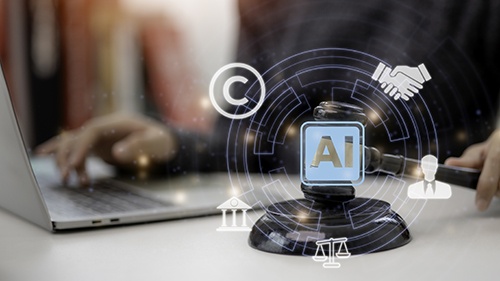Exploring AI to Boost eCommerce Avenues to Success

Utilizing Artificial Intelligence (AI) in beverage production and distribution is a tremendous way to not just stay ahead of the curve, but also empower your eCommerce efforts. As the beverage industry continues to grapple with challenges ranging from supply chain disruptions to inflation and changing consumer purchasing decisions, AI emerges as a pivotal tool in both retail and, more recently, eCommerce.
Contrary to popular belief, AI in beverage eCommerce is not as detrimental or scary as one might instinctively think. In fact, AI is transforming how beverage sellers and distributors maintain their online presence and keep their operations intact, not to mention opening new avenues to success in an increasingly competitive space.
In an age where investor and consumer faith is everything, leveraging AI strategically to improve your eCommerce efforts might be more powerful than you think.
AI Improves Compliance and Security
The beverage industry is heavily regulated and filled with increasing amounts of red tape, particularly for alcoholic or CDB/THC-infused products. However, AI can prove to be a vital asset in helping brands ensure compliance and security with confidence.
For starters, age verification systems - responsible for ensuring products comply with age restrictions for online alcohol sales - are vital for helping brands expand into the fast-paced eCommerce space.

AI can quickly and effectively analyze identification documents to verify age and authenticity, with advanced solutions like document forgery detection able to detect authenticity and mitigate fraudulent activity. AI algorithms can look at transaction patterns as well, with intricate and subtle activities that might indicate fraud being flagged.
Additionally, one of the most outspoken benefits of AI is its ability to critique behavioral patterns and make predictions, where repeated fraudulent attempts to circumvent age restrictions in online purchases can be made easier, and with minimal human intervention.
As eCommerce platforms become the norm, handling increasing amounts of sensitive customer, business and financial data, AI can be harnessed to improve cyber resilience. With the right tools in tow, platform and site owners can monitor network traffic in real-time, identify potential suspicious activity, respond to security threats, and simulate ethical cyber attacks using penetration testing to detect unseen vulnerabilities before they are exploited.
A suite of AI-powered cyber security processes and solutions can ensure brands remain compliant, resilient, and reactive, while ensuring the best possible experience for eCommerce customers and reducing the platform’s attack surface.
AI Strengthens Supply Chain Management
Beverage brands working with third-party packaging and procurement suppliers like BevSource can utilize AI strategically to manage complex supply chain issues and bottlenecks.
AI algorithms can analyze large amounts of historical sales data, seasonal trends, and even sentiment on marketing channels like social media to predict demand for products. This can prove vital for beverage companies handling large amounts of perishable goods or those requiring specific storage conditions, allowing them to optimize their inventory management and logistics processes.
Companies can then minimize the chances of over- or understocking items with the help of AI predictive analysis, which can be handy for popular products or those with a limited shelf life. Storage facilities with units that require accurate, round-the-clock temperature control and environmental condition monitoring can take advantage of AI analytics to ensure product quality all year round. With increasing ESG compliance measures in place, this can also help facilities optimize and reduce their energy usage and minimize waste.
Inflation has - certainly post-pandemic - reduced profit margins for many beverage brands, and with consumer demand changing, dynamic pricing strategies are more imperative than ever. AI can analyze competitor pricing and demand fluctuations, and balancing this with inventory levels can help brands implement optimal pricing for their products. This can help brands stay competitive in an increasingly cutthroat industry while ensuring that they are turning a profit after covering their wholesale costs.
For many beverage brands, particularly smaller players, supplier and buyer relationships are critical. Believe it or not, AI can help strengthen said relationships by tracking and analyzing supplier performance. Brands can stipulate key KPIs and metrics and AI can intuitively - in real-time - inform them about whether suppliers are performing as expected, and whether a reconsideration is worthwhile.
What’s more, in cases of supply chain disruptions - such as crop failures in South America or geopolitical issues in Europe and the Middle East affecting freight - AI can quickly identify alternative suppliers, ingredients, and routes, ensuring continuity of production and material sourcing.
AI Enhances the Customer Experience Online
Brands can ill afford to overlook the customer-facing aspects of eCommerce, especially if they are looking to thrive in the digital space. That’s not to suggest that supply chain optimization is any less crucial, but ultimately, customers are responsible for income generation, and AI can help them achieve that with greater efficiency.

AI algorithms can detect browsing and purchase histories to offer personalized, suitable product recommendations. This can bilaterally expose customers to brands and their diverse product ranges, further improving the experience for them and facilitating repeat product or bundle purchases based on their personal preferences. In turn, brands can reap the benefits of an increased average order value.
Implementing AI chatbots is a practice that many brands - inside and outside the beverage industry - have leveraged in recent years. Chatbots can handle routine queries and questions from consumers and suppliers, such as shipping times and order statuses, thus freeing up human workers to dedicate more time to complex, strategic issues. Conversational AI - none perhaps more widely known than that exhibited by LLM GPT3 - can help customers decide options based on their dietary restrictions, preferences, budget, and other factors.
Overcoming The Challenges of DTC Fulfillment
Direct-to-consumer (DTC) fulfillment is something that many beverage brands are exploring, particularly as a means to maintain profitability. Over 58% of supply chain leaders expect DTC to make up over half of overall sales by 2026. It does pose challenges, but AI can help brands address and overcome many of them.
For brands taking their DTC fulfillment in-house, AI can be used to optimize delivery routes based on the weight of beverage products (which is high), not to mention the rising costs of fuel and transportation. AI can also adjust routes in real time based on order changes, traffic conditions, and other factors. AI can also predict when manufacturing equipment or machinery is likely to need maintenance, reducing operational downtime and improving overall efficiency and compliance with relevant regulations.
AI can also analyze order patterns to suggest optimal packaging solutions, ensuring that brands protect their products in transit, manage consumer expectations, and make important decisions regarding environmental waste management and sustainability. Based on the products in a given order, AI tools can be used to recommend the most suitable packaging options, prioritizing sustainable and eco-friendly ones without compromising product safety.
AI technology is here to stay - it’s only going to evolve at an even bigger and more unprecedented pace in the years to come and to work in tandem with focused technology in the wider hospitality sector, such as property management systems for hotels and leisure firms. Together, AI tools and property management tech can facilitate supply chain operations, revenue streams, marketing functionality, sales, back office management, and more.
Therefore, AI’s applications in the beverage space and eCommerce will only continue to change, meaning that brands should start - if not already - exploring the most suitable place for AI in their facilities and operations.
Beverage brands must, however, approach AI with caution and a methodical mindset. Its benefits are abundant, but successful AI implementation should not be done without careful consideration of its ethical implications. AI still requires careful human management and oversight in any application, however minimal, and it is still prone to bias, error, misjudgment, and other factors which could derail the momentum of drinks brands, rather than enhance it.
AI is only successful when it is appropriately moderated and supervised. However, with the right approach, beverage brands can overcome many incumbent challenges facing supply chains and eCommerce, while positioning themselves for future success in a predominantly digital marketplace.

About The Author: Annie Button is a freelance writer based in the UK, known for her work on topics ranging from business development, PR & branding, digital marketing, and HR. Her work has been published in a variety of prestigious online and print publications.
